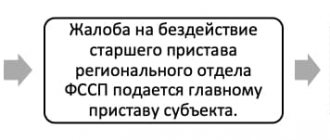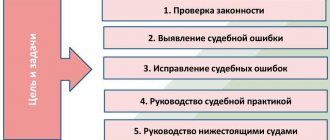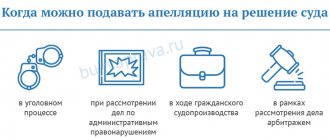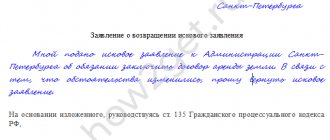Where and when is an appeal against an arbitration court decision filed?
Contents of chapter. 34 of the Arbitration Procedure Code of the Russian Federation regulates the consideration of a case on appeal. According to this rule, a complaint can be filed no later than 30 days from the date of the court’s decision. At the same time, the Plenum of the Supreme Arbitration Court of the Russian Federation in paragraph 12 of the resolution “On the application...” of May 28, 2009 No. 36 emphasizes that the deadline for filing a complaint should not be counted from the day when copies of the act reached the participants in the case or were sent to them, but from the day when when the decision was finally made.
For reference: if the court violated the procedure for sending a copy of the decision to citizens, this fact does not increase the period for filing an appeal, but may serve as a reason for filing an application to restore this period.
The complaint can only be submitted through the arbitration tribunal of the first instance, which considered the case. You can send it in several ways:
- through the court office;
- by mail;
- using the Internet - through the “My Arbitr” system.
Contents of the appeal to the arbitration court, sample
The complaint must contain:
- name of the court, its address;
- Full name and place of registration/residence of the plaintiff, his contact telephone number;
- similar information about other participants in the case;
- name of the court of first instance;
- case number;
- date of adoption of the judicial act that is being appealed;
- subject of dispute;
- the applicant’s requirements with excerpts from the decision and references to regulations;
- list of documents attached to the complaint.
How documents should be included in attachments:
- power of attorney for the representative, if he is involved in the case;
- a copy of the act being appealed;
- papers on sending a copy of the claim to all participants in the process;
- document confirming payment of the duty.
For reference: if the complaint was not accepted by the court the first time and was left without progress, the returned documents and papers must be re-attached.
A sample appeal against a decision of the arbitration court can be downloaded on our website.
Who can file a complaint and when?
The decision of the arbitration court of first instance is not final and, if necessary, it can be challenged. This legal position is aimed at preventing abuse of the courts and serves as a prevention of corruption.
By way of appeal, it is possible to challenge the decision of the arbitration tribunal of the first instance until it enters into legal force under clause 1 of Art. 257 APC No. 95-FZ of 2002. This document allows you to challenge a decision on economic disputes between individuals and legal entities. A limited number of persons have the right to submit such a complaint:
- Direct participants in the arbitration process (plaintiff, defendant).
- Persons who do not participate in the case if the adopted judicial act in the arbitration court directly affects their rights and legitimate interests.
- Persons who are legal successors of the participants in the case who did not enter into the process during its mediocre consideration in the arbitration court of first instance.
- Prosecutors for cases listed in paragraph 1 of Art. 52 of the APC , even if they did not take part in the consideration of the case in the court of first instance under the APC (based on paragraph 1 of the Resolution of the Plenum of the Supreme Arbitration Court “On the application of the APC...” of 2009 No. 36).
The complaint is transferred to the arbitration court of first instance, which must forward it to the higher court within 3 days.
The ruling of the court of second instance is determined by the Federal Law on Arbitration Courts of 1995 (Article 258 of the Arbitration Procedure Code).
Contents of the appeal against the ruling of the arbitration court, sample
The parties to the proceedings have the right to appeal court decisions that were made during the proceedings in the manner prescribed by Art. 272 of the Arbitration Procedure Code of the Russian Federation.
The complaint includes the following information:
- an indication of the details of the case being considered in the first instance;
- information about the ruling made;
- grounds for disagreement with the document;
- links to legal acts;
- applicant's requirements;
- list of attached papers.
For reference: a citizen can demand that the appellate court either cancel the act in whole or in part, or send it for a new trial.
You can draw up a complaint against a decision using the example of a complaint against a decision already presented above, substituting the necessary information regarding the indication of the act being appealed, the grounds for filing a complaint, requirements, changes in the list of attached documents. You can also download a sample of it on our website.
So, an appeal against the decision of the arbitration court must be sent to the arbitration court of first instance in compliance with the deadlines and procedures established by law. The document should not contain new requirements, since only those circumstances that are set out in the judicial act can be disputed.
What should an appeal contain?
The appeal consists of introductory, descriptive, motivational and operative parts. The complaint may be in written or printed form. It should not contain syntactic or spelling errors. The complaint should indicate the following details that give the document legal force:
- Name of the arbitration court to which the complaint was sent.
- Full name of the citizen or name of the organization submitting the complaint, names of other participants in the case.
- The name of the arbitration court of first instance , which made the decision subject to challenge.
- Details of the decision made by the arbitration court , the date of its delivery and the essence of the dispute.
- Grounds for filing an appeal.
- Requirements of the person who submitted a complaint to the court justifying the person’s disagreement with the decision made . Such requirements must be substantiated and referred to regulations that confirm the applicant’s position. The applicant may submit a request for full or partial cancellation of the arbitration court decision.
- List of attachments to the complaint based on clause 2 of Art. 260 APK .
The complaint should include the contact information of the complainant (his phone number, fax, email address, etc.), petitions of the participants and other important information for the case.
The text of the complaint does not include demands that were not voiced during the consideration of the case in the court of the previous instance. That is, the case is not considered on the merits by the appellate court: it only analyzes the legality of the decision made by the court under paragraph 3 of Art. 257 APC.
When filing an appeal against a decision of an arbitration court, the amount of the state fee is determined as 50% of the amount of the state fee for filing a claim that is of a non-property nature (according to paragraph 12, paragraph 1, Article 333.21 of the Tax Code). Taking this into account, the state fee for filing an appeal is 3,000 rubles.
The documents that need to be attached to the complaint may include:
- The appealed decision of the arbitration court or a copy thereof.
- Documents that confirm sending copies of the appeal to other participants.
- A receipt confirming payment of the state duty (documents that confirm benefits when paying the state duty).
- Power of attorney or other document confirming the authority of the signatory.
- Petitions in the case and other important documents for the appeal.
A sample appeal against a decision of the arbitration court can be downloaded here.
Appeal against the decision of the arbitration court
An appeal is a procedural document drawn up in accordance with the rules established by Chapter 34 of the Arbitration Procedure Code of the Russian Federation, in which the applicant requests to cancel or change the decision of the first instance that has not entered into legal force. It has the following features:
- an appeal can be filed by persons who participated in the case (plaintiff, defendant, third party), or by those who did not participate (if a judicial act was made in relation to their rights and obligations);
- its filing is possible only in relation to a decision that has not entered into force;
- submitted through the first instance;
- the applicant cannot include new requirements that were not the subject of consideration in the court of first instance.
In order for your application to be satisfied, make sure that there is at least one of the grounds for this provided for in Article 270 of the Arbitration Procedure Code of the Russian Federation:
- incomplete determination of circumstances relevant to the case;
- failure to prove the circumstances established by the judge that influenced the outcome of the case;
- discrepancy between the judge’s conclusions and the available evidence;
- violation or incorrect interpretation by a judge of substantive or procedural law.
In accordance with Article 262 of the Arbitration Procedure Code of the Russian Federation, a person participating in the case has the right to send his response to the appeal to the arbitration court, citing his arguments and objections. The review is drawn up according to the same rules and form as the appeal.
How to submit
The header of the document indicates the name of the court to which the complaint is sent, and it is submitted through (to) the court of first instance that made the court decision, then the office of the trial court sends the materials of the trial to the address of the court of appeal.
In this case, the court whose decision is being appealed is obliged to send the complaint along with the court case to the appropriate appellate court within 3 (three days) from the date it was received by the court (Part 2, Article 257 of the Arbitration Procedure Code of the Russian Federation).
Is it possible to provide additional evidence?
After reviewing the materials of the court case, including the minutes of court hearings, it is necessary to find procedural errors and circumstances that were not properly assessed by the court.
Additional evidentiary materials can be presented, but the possibility of including them in the case materials will be determined at the court hearing of the appellate court.
Is it possible to file new claims?
No, new claims cannot be submitted in an appeal that were not the subject of consideration in the arbitration court of first instance (Part 3, Article 257 of the Arbitration Procedure Code of the Russian Federation).
Procedure for compilation
The form and content of the appeal are established in Article 260 of the Arbitration Procedure Code of the Russian Federation. It should indicate the following:
1. “Hat”, which includes:
- full name of the court;
- details of the persons participating in the trial (for legal entities this is the name, INN, OGRN, address, for individuals - full name, passport details and contact information);
- name of the arbitration court that made the appealed decision, case number, date of the decision, subject of the dispute.
2. Main part. Here you need to describe the essence of your requirements, as well as the grounds on which you are appealing the decision. To increase your chances, you should provide references to laws and other significant circumstances that are relevant to the case.
3. “The pleading part.” In the sample, it begins with the word “I ask”: the complainant can ask the court to reverse the decision in whole or in part.
4. Final part. It contains a list of attached documents, the applicant’s signature and the date the document was drawn up.
If you do not want your application to be left without progress, you must attach the following documents to it:
- a copy of the contested decision;
- receipt of payment of state duty;
- confirmation that the complaint has been sent to all persons involved in the case (postal checks);
- a power of attorney or other official document confirming the authority to sign the appeal.
Please note that the complainant is obliged to send to all participants in the case not only the text itself, but also all attached documents. This can be done either by registered mail with notification, or in person against signature.
Form and content (clause 1 of article 125 of the APC)
An appeal in an arbitration case is submitted to the arbitration court in writing. The complaint is signed by the person filing it, or his representative, acting by proxy and authorized by him to sign this document.
A complaint can also be filed electronically by filling out a form posted on the official website of the arbitration court on the Internet. For this you will need a personal electronic key.
What should be indicated in the appeal (clause 2 of Article 125 of the APC):
- name of the arbitration court to which the appeal is filed;
- name of the person (telephone, address) filing the complaint and other persons participating in the case;
- name of the arbitration court that made the appealed decision, case number and date of the decision, subject of the dispute;
- reasons why the decision of the court of first instance is illegal, unreasonable and unmotivated, adopted in violation of the norms of the Code of Criminal Procedure of the Russian Federation, substantive law and the Constitution of the Russian Federation;
- list of documents attached to the complaint.
How to send a document to court
The appeal to the arbitration court is sent through the first instance, which considered the case. The appellate instance is selected according to the general rules for choosing a court based on generic and territorial jurisdiction.
Deadline for filing an appeal in the arbitration process
In accordance with Article 259 of the Arbitration Procedure Code of the Russian Federation, the parties have a month to appeal after the verdict. Current legislation also provides for the possibility of reinstating the deadline if the applicant had valid reasons for missing it. To do this, you must submit an appropriate petition, indicating in it the reasons for the untimely filing of the appeal (illness, long-term departure, etc.)
Also, the term will be restored if the applicant proves that he did not know about the court decision, the content of which affects his rights and obligations.
The Arbitration Procedure Code of the Russian Federation also establishes shortened deadlines for appeal (10 days) for some categories of cases, for example:
- in cases of bringing to administrative responsibility;
- in cases considered through simplified proceedings;
- in bankruptcy proceedings.
It is also necessary to remember that the appeal is filed through the first instance, which, in turn, transfers it to the appellate court within three days along with all the case materials.
The Plenum of the Supreme Court clarified the appeal under the Arbitration Procedure Code
The plenum was again held online. According to Supreme Court Judge Elena Borisova, new clarifications are needed to unify procedural rules. At the same time, the working group tried to preserve existing, “time-tested and practice-tested” approaches when considering cases. The draft clarification consists of almost 50 points, divided into three sections.
The chairman of one of the appellate courts, which will have to apply the clarifications of the Supreme Court in practice, Erdem Dorzhiev recalled: since 2009, when the Plenum of the Supreme Arbitration Court explained the peculiarities of the production of economic cases in appeal, the APC has already been amended more than 40 times. “The new resolution reflects changes in procedural legislation, as well as the positions of the Supreme Court formed when considering specific cases,” he emphasized.
In parallel with the clarifications of the appellate proceedings under the APC, the Plenum of the Supreme Court also clarified the rules for considering cases in cassation. Read more about them in the material “Plenum of the Supreme Court: features of cassation in economic cases.”
Following the meeting, the draft resolution was sent for revision. A link to the text of the draft clarification is at the end of the material.
1
Right to complain
The Plenum clarifies who generally has the right to appeal decisions of arbitration courts. These can be either direct participants in the dispute or persons who did not participate in the consideration of the case, but if the decision affects their rights and obligations. Prosecutors can also appeal decisions in cases in which they were not involved. Business ombudsmen can only appeal if they were involved in the first instance.
2
Cassation instead of appeal
In some cases, the second instance does not mean that it is an appellate instance. The Plenum of the Supreme Court explains: you need to immediately appeal in cassation:
- court orders;
- rulings to cancel the arbitration court's decision;
- determinations on the issuance of the execution warrant for its forced execution;
- rulings on recognition and enforcement of a foreign court decision;
- other definitions for these categories of disputes.
Decisions of the specialized Court for Intellectual Rights come into legal force immediately after adoption, and therefore cannot be appealed. They need to be complained about immediately to the presidium of this court.
3
Shortened terms
Some acts of the first instance must be complained about within a shortened period of 10 days. For example, these are determinations on the transfer of a case to jurisdiction, on the refusal to satisfy a request to involve a co-defendant, and other procedural decisions of the court. When appealing such determinations, the appellate court may postpone consideration of the dispute in the first instance.
A shortened period is also provided for cases of administrative offenses.
4
Two in one
An appeal can be filed against one or several judicial acts of the first instance. For example, one complaint may contain demands to appeal the decision in the case and a ruling to return the counterclaim. In this case, the arbitration appeal has the right to issue one ruling on acceptance of the complaint for proceedings, as well as one judicial act based on the results of their consideration.
The exception is complaints regarding acts issued in bankruptcy cases. They need to appeal each determination separately.
All appeals filed against one judicial act must be considered in one court hearing.
5
Complain directly to the AAS
As a general rule, an appeal must be filed through the court of first instance. But there are exceptions to this rule. For example, if the appellate court has already opened proceedings on an appeal in the same case, you can file the appeal directly there. In such a case, the appeal will not return the complaint to the complainant.
6
We calculate the deadlines correctly
The Plenum of the Supreme Court reminds: the deadline for filing an appeal is counted not from the date of sending a copy of the decision to the parties to the dispute, but from the date of production of the judicial act in full or from the date of signing by the judge of the operative part of the decision in a case considered through summary proceedings.
The Plenum of the Supreme Court gave an interpretation of the termination of obligations
If the first instance delays in preparing the decision, the period for appeal is not automatically extended. However, the parties to the dispute have the opportunity to apply for restoration of the missed deadline.
The Plenum also provides explanations to the courts on how to determine whether a party has met the deadline for appealing or not. A stamp on the envelope or a receipt for the letter at the post office will help.
If the court has doubts that the complaint was filed on time, it may ask the applicant for additional evidence of this fact.
7
(Un)valid reasons
The court may reinstate the deadline for filing a complaint if the reasons for missing the deadline were valid. The Plenum of the Supreme Court clarifies what can be considered a valid reason. For example, this is the introduction of a high-alert regime on the territory of a constituent entity of the Russian Federation, which provides for restrictions on free movement and presence in government and other institutions.
Plenum of the Supreme Court: how to consider appeals in administrative cases
The court can restore the term even when the applicant did not know about the existence of the appealed decision for a long time. This is possible if the complaint is filed by a person who did not participate in the consideration of the case in the first instance.
The list of unexcusable reasons for missing a deadline is a little more detailed. The Plenum of the Supreme Court includes among them the need to agree with a higher authority (or with someone else) on the issue of filing an appeal. Internal organizational problems of a legal entity are also not a reason to miss a deadline. As does the absence of a lawyer on staff, as does the lawyer’s vacation.
8
Additional evidence
Sometimes the appeal may consider new evidence in the case. But to do this, the one who provides this evidence needs to confirm that he could not show it in the first instance (for good reasons). Among such valid reasons, the Plenum of the Supreme Court includes cases where the first instance unreasonably rejected a party’s request to request additional evidence or to order an examination.
The clarifications emphasize that “recognition of evidence as relevant and admissible in itself is not a basis for its acceptance by the arbitration court of appeal.”
9
Lack of documents
The Plenum of the Supreme Court emphasizes: if the applicant of the appeal has not attached a copy of the appealed judicial act, this does not prevent the consideration of the complaint, because the judicial act is already in the case file.
However, you will still have to send a copy of the appeal to the parties in the case. The court may even adjourn the case until the applicant proves that he actually sent a copy to other parties to the case.
10
New consideration of the case
Based on the results of consideration of the appeal, the court may return the case for a new trial at the first instance. Issues the resolution of which falls within the jurisdiction of the court of first instance and which the court did not consider on the merits can be sent back to the lower court. For example, due to the unjustified return of a statement of claim, refusal to accept it, leaving the application without consideration, termination of proceedings in the case or refusal to review a judicial act due to new or newly discovered circumstances.
Results 2019: all explanations of the Plenum
If the first instance committed gross procedural violations, due to which the decision should definitely be canceled (Part 4 of Article 270 of the APC), then the appeal does not send the case for a new consideration, but simply cancels the decision and considers the dispute itself according to the rules of the first instance.
Draft resolution of the Plenum of the Supreme Court “On the application of the Arbitration Procedural Code of the Russian Federation when considering cases in the arbitration court of appeal.”
- Pravo.ru
- Arbitration process
- Supreme Court of the Russian Federation
Time limit for consideration of an appeal in the arbitration court
Article 267 of the Arbitration Procedure Code of the Russian Federation establishes that a complaint must be considered by a judge within two months from the date of its receipt. However, it may be returned to the applicant if:
- filed by a person who does not have the right to appeal;
- filed against a judicial act, which is not appealed through the appellate procedure;
- the deadline for its submission has expired;
- the applicant withdrew his complaint;
- the circumstances that served as the basis for leaving the application without progress have not been eliminated (Article 263 of the Arbitration Procedure Code of the Russian Federation).
If the court has made a decision to return your appeal, then after eliminating all the shortcomings, you have the right to appeal again.
Terms of consideration
According to Art. 267 of the APC, the appeal must be considered within 2 months from the date of its receipt. But it is worth noting that the paperwork will not be opened at all due to the following reasons:
- the complaint was filed by a person who does not have the right to do so;
- the applicant requests to appeal a court decision, which cannot be reviewed within the framework of appeal proceedings;
- the deadline for filing an appeal has expired;
- the complainant personally withdrew his application;
- there are grounds on which the application should remain without progress (Article 263 of the APC).
If the court decides to return your appeal, after correcting any shortcomings, it can be resubmitted.
So, if the ruling of the appellate court has not yet entered into legal force, it can be appealed. To do this, a complaint must be sent to the court of first instance within 30 days from the date of proclamation of the unsuitable decision. It must be drawn up correctly, otherwise the appeal proceedings will not be initiated.
Complaint, appeal, against the decision of the arbitration court on eviction, sample, form
Defendant: OJSC "_____________________" __________, Moscow, st. _____________, d.____ (person who filed the appeal)
Third parties: 1) Federal Agency for Federal Property Management 109012, Moscow, Nikolsky Lane, 9 2) Federal Registration Service for Moscow 115191, Moscow, st. B. Tulskaya, 15 Case No. A40-______________________________
Appeal against the decision of the Moscow Arbitration Court dated __.__.201_ in case No. A40-__________________________
“___” ___________ 201_ The Arbitration Court of Moscow in case No. A40-______________ made a decision according to which the Arbitration Court satisfied the plaintiff’s demands for the eviction of OJSC “______________________” (hereinafter OJSC “________________”) from non-residential premises located at the address: Moscow, st. ___________, Yes exactly: _______________________.
The defendant believes that the decision made is illegal and subject to cancellation, since it was made in violation of the norms of substantive and procedural law.
In violation of the requirements of Art. 168 of the Arbitration Procedure Code of the Russian Federation, the judge ___________________ did not evaluate either the arguments or evidence presented by the defendant, and therefore the opportunity to correctly determine the circumstances relevant to the case, and therefore the nature of the controversial relationship that arose, was excluded, which in turn led to the incorrect application of the rules of material rights. As a result of violation of the norms of procedural and substantive law, the court made an illegal decision, which ordered the defendant to vacate the occupied premises.
The court did not examine the issue of the legality of the grounds for ownership of the disputed premises by the defendant, since it did not take into account his objections and did not evaluate the evidence provided by the defendant in support of his arguments.
OJSC "____________" is the owner of the disputed premises, on the basis of the Order of the Territorial Administration of FAUFI for the city of Moscow dated "___" ___________ 20__ No. _______ "______________________________" and the Transfer Act of the property complex of the federal state unitary enterprise "___________________________" subject to privatization, approved by the Deputy Head of the Territorial Department of FAUFI in Moscow __________________ “___” ___________ 20__. In accordance with clause 1.1. of the Charter of OJSC "_____________" is the legal successor of FSUE "________________". Before privatization, FSUE "___________" owned the disputed premises with the right of economic management (clause 3.1. of the Charter of FSUE "________________"). In accordance with the established procedure, these premises were entered into the Register of Federal Property (certificate dated __.__.19___, registration number __________________) and were on the balance sheet of the enterprise.
By order of the Territorial Administration of FAUFI for Moscow No. _________ dated “___” ___________ 20__. part of a building with a total area of ___________ sq.m., located at the address: Moscow, st. ________________, d. __, was assigned the right of economic management to the Federal State Unitary Enterprise "________________".
The fact that the specified premises are assigned under the right of economic management to the Federal State Unitary Enterprise “______________” is also confirmed by an extract from the register of federal property as of __.__.20__.
Information on the termination of property rights of the Russian Federation and, accordingly, termination of the right of economic management of FSUE "_____________", as well as any information that __________________ at the address: Moscow, st. ________________, d __ in the prescribed manner withdrew from the ownership of the Russian Federation before the privatization of the Federal State Unitary Enterprise “____________” is not available.
Under such circumstances, the purchase and sale agreement dated __.__.20__. is invalid due to its insignificance and does not entail any legal consequences, and JSC “_____________” is not the owner of the disputed premises and does not have the right to bring a claim for recovery of property from someone else’s illegal possession against JSC “__________” on the basis of Art. 301 Civil Code of the Russian Federation.
The full form of the standard form and sample of the appeal against the decision of the arbitration court on eviction can be downloaded from the form attached to the page.
Appeal against the decision of the Arbitration Court
In __________ arbitration court of appeal _____________________________________________
Plaintiff: LLC "______________________________" Postal address:________________________________
defendant: LLC "_______________________________" Legal address:___________________________
Government duty : ______________________
on the decision of the Arbitration Court of the city _______ dated __________ in case No. _____________ (on the claim of LLC "____________________" against LLC "____________" for debt collection)
By the decision of the Arbitration Court of the city _______ dated __________ from the Limited Liability Company “______________” in favor of the Limited Liability Company “____________”, ___________ rubles __ kopecks were recovered as debt. and reimbursement of legal expenses for payment of state fees - ______ rubles. I consider this court decision to be illegal, unfounded and subject to change on the following grounds: 1. Incomplete clarification by the court of first instance of the circumstances relevant to the case. In its decision, the court of first instance refers to the fact that a framework supply agreement No. ____ dated ____________ (with appendices) was concluded between the parties, within the framework of which the defendant supplied goods to the plaintiff. According to the terms of the supply agreement for the supplier, in addition to the obligations to supply goods, special obligations of the supplier are established, including the obligations of the supplier (LLC "_____________") to pay premiums to the plaintiff. In accordance with the terms of the supply agreement, the supplier is subject to payment to the buyer of the amounts of discounts and premiums agreed upon by the parties, established in the relevant Appendix No. __ to the supply agreement in relation to the relevant periods of the relationship between the parties. The amounts and types of discounts and bonuses are determined and established by Appendix No. __ to the framework agreement. The volume of commodity purchases under the framework agreement is determined in the annual volume certificates, the fact of delivery for ___________. also confirmed by the delivery notes submitted to the case. In addition, the plaintiff, as part of its obligations under the framework agreement, issued invoices for payment of premiums, of which there is documentary evidence. And, since, as the court indicated in its decision, the plaintiff provided evidence of the debt under the supply contract for payment of the premium, the claims should be recognized as legitimate, reliable, proven and subject to satisfaction. However, the trial court unjustifiably came to such a premature conclusion, without fully examining the factual circumstances of the case. In this case, the contract for the supply of goods was concluded in full compliance with the requirements of civil legislation, in particular, Chapter 30 of the Civil Code of the Russian Federation. According to Art. 507 of the Civil Code of the Russian Federation, in the event that, when concluding a supply contract, disagreements arose between the parties on certain terms of the contract, the party that proposed to conclude the contract and received from the other party a proposal to agree on these conditions must, within thirty days from the date of receipt of this proposal, unless otherwise the deadline is not established by law or not agreed upon by the parties, take measures to agree on the relevant terms of the contract or notify the other party in writing of the refusal to conclude it. In accordance with clause 3. 5 of the Agreement - general terms of delivery - the amounts subject to withholding after the transaction are paid to the buyer once a year for a period of time up to ___________ of the previous year, and the calculation is based on the total amount of turnover achieved by the buyer and supplier during the reporting period. In satisfying the claims, the court of first instance referred to the reconciliation act between the parties, which allegedly, as claimed by the plaintiff’s representative, reflected the amount of debt for the goods actually delivered and sold. However, these statements are not true. The court of first instance recovered _______ rubles __ kopecks in favor of the plaintiff. At the same time, according to the act of reconciliation of mutual settlements carried out between the parties, the debt of LLC "________________" to LLC "_____________________" amounted to ______ rubles __ kopecks. All our objections to the claims made by __________________ LLC were not taken into account by the court of first instance, which was the reason for the unjust decision, due to incomplete clarification of the circumstances relevant to the case. All of the above circumstances led to the adoption of an unjust decision that violates the rights and legitimate interests of LLC “________________________”. Based on the above and guided by Art. 4, 257, 259, 260, 270, APC of the Russian Federation, -
P R O S H U S U D:
1. The decision of the Arbitration Court of the city _______ dated __________ in case No. __________________ on the claim of LLC "_____________" to LLC "_______________" for debt collection - amend. 2. Adopt a new judicial act in the case, by which the claims of LLC "____________" to LLC "______________" for debt collection are partially satisfied by collecting from LLC "____________________" in favor of LLC "____________" in compensation of the debt ______ rubles __ kopecks. 3. To recover from LLC “_____________________” in favor of LLC “_____________________” the costs of paying the state duty in the amount of __________ rubles.
Appendix: 1. receipt for payment of state duty; 2. copies of the appeal; 3. receipt for sending a copy of the appeal to the plaintiff; 4. copy of the decision of the Arbitration Court of ________ dated ___________;
General Director of LLC "____________________" _____________
What does an appeal look like?
An appeal against a decision of the arbitration court is filed through the first instance. It consists of two parts: introductory and main. The introductory information includes the details of the appellate authority and the applicant. The main part contains details of the case and arguments indicating the unfoundedness of the judicial ruling.
When writing a complaint, you should use the following plan:
- Details of the court that will consider the complaint.
- Applicant details. If this is an individual, indicate the procedural position, full name, place of residence, passport details. For legal entities, you must enter the name of the organization, INN, OGRN, and address.
- Data from other aspects of the case.
- Name of the form.
- Information about the arbitration court where the contested decision was received. Information about the case: number, date of announcement of the verdict, essence of the claim.
- The applicant's arguments and his arguments in favor of reversing the decision. Here it is important to refer to specific provisions of the law.
- Request. It is expressed briefly and begins with the word “please.” As a rule, the author of the appeal asks for the cancellation or modification of a court order.
- List of documents attached to the complaint.
- Date of application.
- Signature.
In order for an appeal to be accepted by the court, a complete package of documents must be attached to it. Among them are a receipt for payment of the state duty, a copy of the decision of the first instance.
The applicant needs to confirm that he has provided copies of the papers to all participants in the process. They are sent by registered mail or delivered in person against signature. This document (or postal receipt - in the case of sending by letter) is attached as confirmation. The appeal will be accepted for consideration only if all legal requirements are met.
Reasons for filing
The appeal is prepared according to the rules of Chapter 34 of the APC:
- It is submitted by persons who participated in the case as a plaintiff, defendant or third party.
- It is transmitted through the first instance.
- It can only be filed in relation to a decision that has no legal effect.
In order for an appeal against a court decision to be satisfied, it must be based on compelling reasons. The list of such grounds under Art. 270 APK can be included:
- Incomplete definition of circumstances that are important to the case.
- Lack of proof of circumstances that influenced the outcome of the case.
- Violation by a judge of the norms and requirements of substantive and procedural law or their incorrect interpretation by the judge.
- Inconsistency of the court's conclusions with the evidence.
What arguments should be given in the complaint?
An important part of the appeal is the description of the applicant's position. Here he should explain what norms the decision violates and whose rights are infringed. The sample appeal to the arbitration court contains references to specific laws and articles of codes.
You can use as arguments:
- evidence in the case;
- conditions for taking actions;
- norms of substantive law;
- norms of procedural law.
The arbitration court's insufficient examination of the evidence presented could have led to an unlawful decision. Having pointed this out, the applicant argues in favor of canceling or amending the resolution. In addition, it is allowed to present new evidence in the case.
The law may have been misinterpreted during the hearing. It is possible that inappropriate laws may be applied or appropriate laws may not be applied. Similar points are also indicated in the text of the complaint. At the same time, the author explains how legal norms should be interpreted in this dispute.
Types and cost of lawyer services for filing an appeal to an arbitration court
Filing an appeal to the arbitration court in Moscow is one of the services of the PravoZashchita center within the framework of defending the interests of citizens, entrepreneurs and legal entities. The service includes a whole range of activities:
- client consultation;
- analysis of the controversial verdict and materials in the case;
- drawing up and filing an appeal - full, clarified, additional;
- preparation of petitions, objections, petitions;
- tracking the further progress of the complaint.
The cost of services is calculated at flexible rates. Free assistance is provided in the form of consulting and discounts with comprehensive support. The terms of cooperation and the amount of remuneration are specified in the contract, and all costs are agreed upon with the customer.
How long does it take to go to court?
In accordance with paragraph 1 of Article 259 of Law No. 95-FZ, an appeal against a court decision is filed within a month from the date of its issuance. If due to compelling reasons this deadline was missed, the applicant has the right to file a petition for reinstatement. The arbitration court may cooperate if the reason for absence is a documented illness or business trip. The deadline can also be restored if the applicant did not know about the decision.
The order of consideration is as follows:
- The complaint is accepted in the office of the arbitration court of first instance.
- Within three days, the application is forwarded to the appellate court.
- In the second instance, the case is considered within two months from the date of receipt of the complaint.
In a number of situations, the appeal is returned back. This happens if it is submitted after the expiration of the period without a petition for its restoration. Another possible reason is that a person who does not have the right to do so is trying to challenge the decision. The complaint will be returned even if the applicant himself withdraws it.
Sometimes the reason for the return is inaccuracies in the execution of the document and non-compliance with the rules for going to court. In such a situation, after eliminating the shortcomings, the citizen has the right to appeal the case again.










